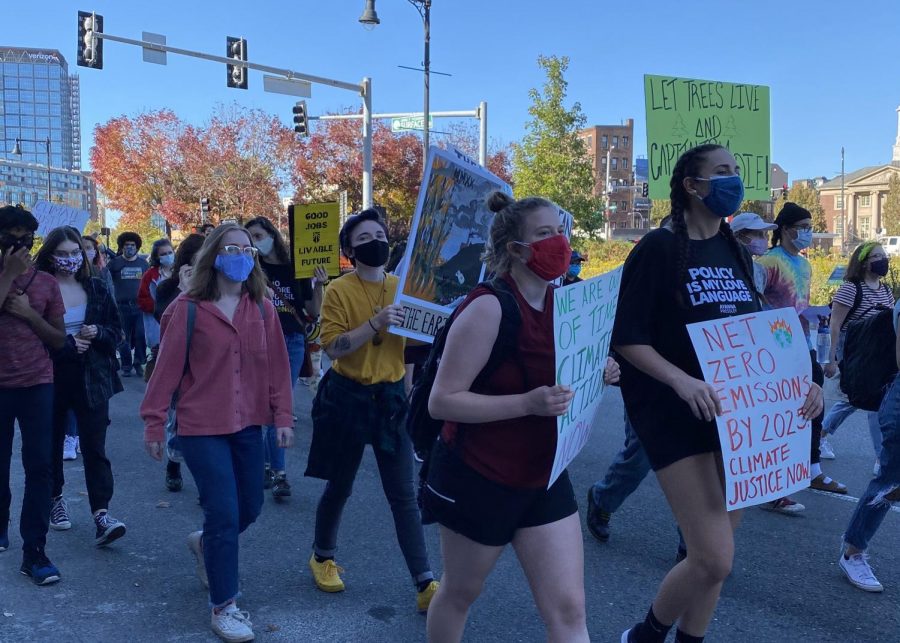Strike Boston fights for climate, social justice
Students and workers marched Oct. 15 for the Climate Justice Strike.
October 27, 2020
Dozens of students and workers marched Oct. 15 for the Climate Justice Strike and demanded environmental justice in Boston and wider Massachusetts.
The protest, which was led by Strike Boston, was endorsed and joined by many other climate and social justice organizations such as the Freedom Fighters Coalition, Blue Crime Blue Dime and Extinction Rebellion MA. The strike began at Boston City Hall, and there were six speakers from different organizations. Many of the speeches emphasized the link between climate justice and social justice as well as the impact that climate change has on the minority, particularly Black or Indigenous peoples’ communities.
“You can’t talk about climate change without talking about white supremacy, and you can’t talk about climate change and white supremacy without talking about capitalism,” said Marissa Matson, member of the Freedom Fighter Coalition and founder of Strike Boston. “I’m not asking [the government]. I’m telling them. We don’t depend on you, you depend on us.”
These organizations collectively called for several demands, including prioritizing justice demands from the Black community, honoring and respecting rights of Indigenous Peoples as well as calling for a Green New Deal that adopts the Red Deal, an Indigenous climate plan proposed by the Red Nation.
“I think that the central law of traditional mainstream environmental organizing and advocacy is whiteness and its lack of intersectionality. You look at Massachusetts, which is [a] very progressive place we often think, and a lot of very popular environmental organizations are here,” said Koyla Shields, member of Strike Boston and the Freedom Fighters Coalition. “However, their boards, their issues, their policies, what they focus on, do not reflect the state or what’s most important to the environment and climate. The people who will be the most affected by climate change, those frontline communities are Black and Brown people, women of color in the global south, for example.”
Matson founded Strike Boston a month ago and found herself connecting with many other social and environmental justice organizations quickly. This inspired her to begin organizing this protest.
“The planning [for the protest] started after the wildfires in California began,” Matson said. “I wanted to put pressure on the government.”
Although the protest was not as big as Matson anticipated, she still described it as a win, as their main objective was to try to get more people and organizations involved.
“Our main idea is that we want to bring as many people in so that we have a group intersectional analysis of climate change, because if we can’t see how climate change is going to affect us on racial lines, there’s no way our solution will be able to account for that and be equitable,” Shields said.
During the protest, Jean-Luc Pierite, president of the North American Indian Center of Boston, addressed the audience to discuss the direct impact that climate change has on Indigenous communities.
“We are the first climate change refugees,” Pierite said. “We cannot have a Green New Deal without the Red Deal.”
Dewi Peaungg, from For the People Boston, urged the audience to hold more protests together with other organizations.
“We’re so quick to sweep things under the rug and pretend it’s not happening,” he said. “If we don’t do this, they will not hear us. We need to change. We need to initiate.”
As the protesters began marching to the Boston Commons, they chanted, “When our planet’s under attack, what do we do? Stand up, fight back!”
Several other speakers from other organizations, such as Refuse Fascism – Trump/Pence Out Now Boston, Green Era MA and Sunrise Movement Northeastern, spoke to the audience at the Boston Commons.
“I’ve been to other climate justice protests before but with this protest, [the speeches] were so powerful,” said Sophie Leggett, a first-year environmental science and political science combined major and member of Sunrise Movement Northeastern.







